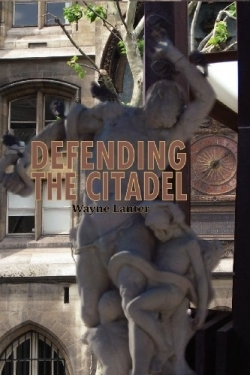Defending the Citadel
A Personal Narrative
Defending the Citadel is one professor’s reflections on the past eighty years of higher education in America. Lanter’s story is told through the lens of four decades of administrative and faculty conflict at Belleville Area College. He traces the power struggles between different organizations battling for control of colleges and universities and describes the Belleville Area College faculty strike of 1980 in riveting detail.
Lanter’s smooth, easygoing style allows readers to feel as if they are taking part in an intimate conversation. The extensive use of personal experience and Lanter’s storytelling ability make his memories come alive. The use of the first-person perspective throughout the book also makes emotions more immediate to the narrator and, thus, to the reader. Describing his escape from the police, he writes, “There was a road grader parked nearby, so I slipped behind it, while Christeck ran a diversionary tactic.”
However, though the first-person narration is mostly effective, at times it indicates authorial sloppiness. Lanter writes, “I should add, however, that Smith appeared to have been a somewhat reluctant performer.” In this example, the first clause dilutes the effect of the purposeful narrative and demonstrates an absence of thorough editing.
Lanter does an excellent job of presenting the harsh realities of teaching in the world of higher education. He bluntly notes, “Teachers generally prefer to be left to their solitary academic pursuits and would rather not soil their hands with the mundane and seamy world of politics … But in truth … politics is inherent in teaching.” Lanter clearly understands the environment in which college faculty operate.
The author is sometimes, however, overly idealistic about the justice of the faculty’s cause in the 1980 strike. Describing the extensive extracurricular work in which faculty engage, he says, “That is why we came to teaching in the first place, to provide for students, the community and thus, little by little, for the larger society.” Every story has two sides; Lanter’s would be more believable if he spent less time holding the faculty’s so-called noble behavior up against the supposed villainy of the opposing side.
Lanter—an English professor, a writer, and an editor—has extensive experience with language and a talent for writing that clearly make Defending the Citadel an interesting, thought-provoking book.
Reviewed by
Wayne Lanter
Disclosure: This article is not an endorsement, but a review. The publisher of this book provided free copies of the book and paid a small fee to have their book reviewed by a professional reviewer. Foreword Reviews and Clarion Reviews make no guarantee that the publisher will receive a positive review. Foreword Magazine, Inc. is disclosing this in accordance with the Federal Trade Commission’s 16 CFR, Part 255.

